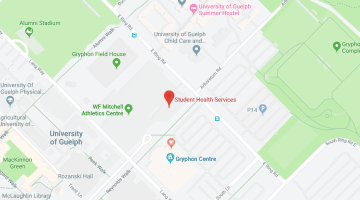In most cases, you don’t need to see your doctor when you have the cold or flu.
See a physician if:
- You have a fever of 38.5°C for more than 48 hours
- You have chest pain, shortness of breath
- You have had coughing spells or coloured sputum
- If you have a persistent sore throat or swollen glands and neck
These are guidelines only. If for any other reason you feel that further attention is necessary, contact Health Services: 519 824-4120 x52131
| Symptoms | COLD (symptoms develop slowly) | FLU (symptoms appear suddenly) |
|---|---|---|
| Fever | Rare | High Fever (39-40°C) |
| Headache | Rare | Usual, Can be Severe |
| General Aches and Pain | Rare | Usual, Can be Severe |
| Fatigue and Weakness | Sometimes, Mild | Usual, Severe |
| Runny, Stuffy Nose | Common | Common |
| Sore Throat | Common | Common |
| Coughing | Sometimes Mild - Moderate | Usual, Can be Severe |
| Complications | Can lead to Sinus Congestion ("congestion" does not equal "infection") | Can lead to pneumonia and respiratory failure, can be life threatening |
| Prevention | Frequent hand washing | Annual vaccination and frequent hand washing |
There is no cure for the common cold. All you can do to feel better is treat the symptoms while your body fights off the virus. For the flu, your doctor will probably recommend that you treat the symptoms until you feel better.
To reduce the symptoms, we would suggest that you follow these guidelines:
- Get plenty of rest, especially with a fever. Rest helps your body fight infection.
- Stop smoking and avoid second-hand smoke, which can make symptoms worse.
- Drink lots of fluids such as water and clear soups. Fluids help loosen mucus. Fluids are also important because they prevent dehydration.
- Gargle with warm salt water a few times a day to relieve a sore throat. Throat sprays or lozenges may also help relieve the pain.
- Avoid alcohol.
- Use saline (saltwater) nose drops or spray to help loosen the mucus and moisten the skin in your nose.
If You Are Sick
- Stay home from school/work and avoid being around people.
- Stay home at least 24 hours after your fever breaks (without the use of Tylenol or Ibuprofen).
Over-the-counter medicines cannot cure a cold or the flu. Medicine can help relieve cold or flu symptoms.
